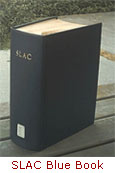
Handy Links
SLAC News Center
SLAC Today
- Subscribe
- Archives: Feb 2006-May 20, 2011
- Archives: May 23, 2011 and later
- Submit Feedback or Story Ideas
- About SLAC Today
SLAC News
Lab News
- Interactions
- Lightsources.org
- ILC NewsLine
- Int'l Science Grid This Week
- Fermilab Today
- Berkeley Lab News
- @brookhaven TODAY
- DOE Pulse
- CERN Courier
- DESY inForm
- US / LHC
SLAC Links
- Emergency
- Safety
- Policy Repository
- Site Entry Form

- Site Maps
- M & O Review
- Computing Status & Calendar
- SLAC Colloquium
- SLACspeak
- SLACspace
- SLAC Logo
- Café Menu
- Flea Market
- Web E-mail
- Marguerite Shuttle
- Discount Commuter Passes
-
Award Reporting Form
- SPIRES
- SciDoc
- Activity Groups
- Library
Stanford
Around the Bay
SLAC's Blue Book Goes Digital
 After years of copyright struggles, the
SLAC
Blue Book is now posted online. First published in 1968, the
Blue Book is an all-encompassing 1169-page, more-than-ninety-author work that thoroughly documents all facets of SLAC's linac.
After years of copyright struggles, the
SLAC
Blue Book is now posted online. First published in 1968, the
Blue Book is an all-encompassing 1169-page, more-than-ninety-author work that thoroughly documents all facets of SLAC's linac.
The Blue Book has always been in high demand as a historical document, and with planning for the International Linear Collider underway, the need for the book continues to increase. Because most SLAC library copies have either been lost over the years or are currently checked out, there are simply not enough books to fully meet demands. In addition, no new copies are available from the publisher.
In reaction to this problem, SLAC library personnel have created a digital version of the book and made it available to all within the SLAC community. But it wasn't as easy as it sounds.
Although the technological aspect of the digitization was easily accomplished with the Stanford University scanning robot, the real difficulty was in securing the legal rights to use the book. The Blue Book is a perfect example of an "orphan work." Under current U.S. copyright law the book should be under copyright; however, library personnel could not definitively locate the copyright holder to ask for permission. The original publisher, W.A. Benjamin, no longer exists, and its holdings have been absorbed by several different companies. The current company that should hold the copyright was unable to find any record of the book.
Due to the lack of records, permission to digitize the book could neither be granted nor denied by the copyright holder; the book was suspended in a legal limbo, with no clear resolution.
Unfortunately, it is not uncommon for non-commercial and niche market books to fall through the cracks due to faulty record keeping, lack of commercial interest, or as companies acquire and merge with each other. The Center for the Study of the Public Domain at Duke University School of Law writes of the magnitude of this situation; "'Orphan Works' probably comprise the majority of the record of 20th century culture."
As a result of this book having no clear permissions given or denied, the Research Librarian worked very closely with Stanford University lawyers in every step of the process to ensure due diligence was met. As a result of this hard work, we have received permission from the University General Counsel to make the full text version available to a world-wide audience.
—Abraham Wheeler, SLAC Today, July 25, 2007